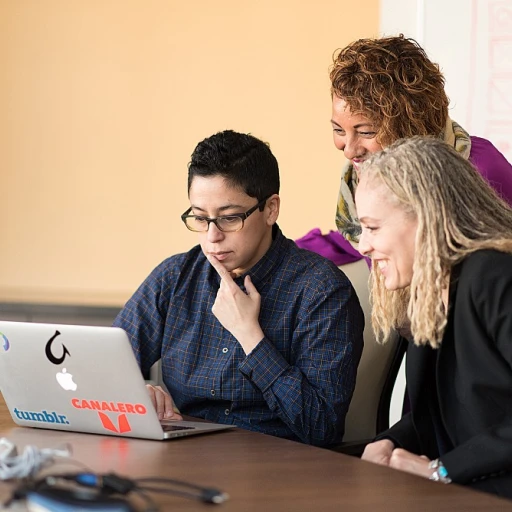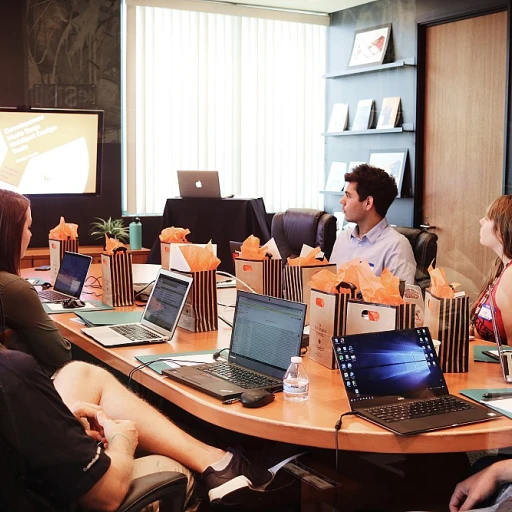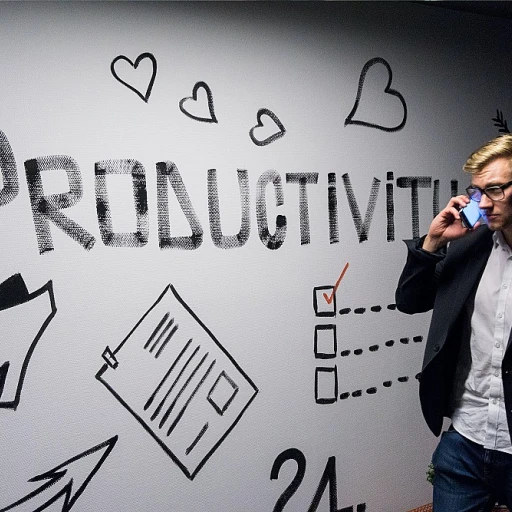
The Evolution of Candidate Profiles
Shifting Paradigms in the Job Market
Understanding the evolution of candidate profiles necessitates acknowledging the transformation in job market dynamics. Over the last decade, roles and expectations have significantly shifted, leading to an intensified focus on varied skills and adaptability. As companies seek to create candidate profiles that align with modern requirements, understanding the ideal candidate's characteristics becomes pivotal. In today's competitive landscape, companies are not just looking for candidates with impressive resumes filled with hard skills. They're on the hunt for talents who complement their company culture and display a robust mix of soft skills. This shift means that candidates are now evaluated on their ability to adapt to different scenarios, communicate effectively, and exhibit emotional intelligence. Leading the hiring process is a team that appreciates these nuances, consisting of hiring managers and recruiters who are well-versed in identifying these multi-dimensional traits. According to a detailed discussion on shaping employer branding, aligning recruiting strategies with organizational values is crucial. The candidate profile of today is therefore not static; it is a dynamic entity influenced by ever-evolving job descriptions and emerging job opportunities. As candidate expectations continue to rise, employer branding has to keep pace, doing more than just highlighting the company's role or products but truly resonating with potential employees by showcasing their commitment to a progressive work environment. To help bridge the gap, companies must invest time in understanding their ideal candidate's profile template, refining their recruitment processes, and ensuring a personalized candidate experience. Succession planning also plays a role here, as having the right profile candidate can help create a seamless transition within the company structure, benefiting both the hiring team and the organizational goals.Key Attributes of Today's Ideal Candidate
Defining the Ideal Candidate in Today's Job Market
In the evolving landscape of recruitment, the profile of the ideal candidate has transformed significantly. Employers are no longer just looking for individuals with the right hard skills but are increasingly valuing soft skills that align with the company culture. This shift is crucial in creating a candidate profile that not only fits the job description but also enhances the overall candidate experience.
Today's ideal candidate is characterized by a blend of technical expertise and interpersonal abilities. Recruiters and hiring managers are placing greater emphasis on attributes such as adaptability, communication, and problem-solving skills. These qualities are essential for thriving in dynamic work environments and contribute to effective succession planning within organizations.
Key Attributes to Look For
- Adaptability: The ability to adjust to new challenges and environments is crucial in a rapidly changing job market.
- Communication Skills: Clear and effective communication is vital for collaboration and team success.
- Problem-Solving: Candidates who can think critically and offer solutions are highly valued.
- Technical Proficiency: While soft skills are important, having the necessary technical skills remains a fundamental requirement.
- Cultural Fit: Aligning with the company’s values and culture is essential for long-term success.
Understanding these attributes will help companies refine their recruitment process and tailor their employer branding strategies to attract top talent. For more insights on how to align your hiring strategies with these evolving profiles, consider exploring the role of APHR in employer branding.
Impact of Social Media on Candidate Profiles
The Social Ripple Effect in Crafting Candidate Profiles
The impact of social media on how candidate profiles are viewed and developed is significant, and it's reshaping the employer branding landscape. With platforms like LinkedIn becoming essential tools for both candidates and recruiters, the way jobs and skills are highlighted has evolved dramatically. Firstly, social media has become a major player in the recruitment process, influencing how recruiters and hiring managers assess candidates. In a time where a simple Google or LinkedIn search can give a comprehensive view of a candidate's professional journey and skills, the importance of maintaining an active and authentic online presence cannot be overstated. Moreover, the role of social media extends beyond just showcasing job descriptions. It helps in creating a more complete view of the candidate profile, highlighting not only hard skills but also crucial soft skills and experiences that define the ideal candidate. This transparency helps companies align their employer branding with the expectations of potential hires. Social media also empowers candidates to research and engage with potential employers, offering insights into the company culture and values. It aids in defining roles more clearly, thus enhancing the candidate experience and streamlining the hiring process. Another dimension is the company's active presence on social media, which plays a critical role in attracting and retaining top talent. Showing genuine engagement and community involvement boosts a company’s image as an ideal workplace, making it more appealing to qualified profiles who align with the brand's values. In an age where social media is an integral part of personal and professional lives, integrating next-gen talent management systems can further enhance employer branding. These tools help recruiters streamline their process by creating detailed candidate profiles based on social insights and engagement, ultimately aiding in succession planning and building a future-ready team. In conclusion, social media's pervasiveness offers a unique opportunity to shape and refine how candidate profiles are built and perceived, making it an indispensable aspect of the modern hiring process.Aligning Employer Branding with Candidate Expectations
Bridging the Gap Between Employer Branding and Candidate Expectations
The modern candidate profile has transformed significantly, influencing how companies approach recruitment. To remain competitive and attract the ideal candidates, employers need to align their branding strategies with the expectations of today's job seekers. This alignment involves understanding what candidates prioritize in their search for job opportunities and incorporating those elements into the employer's brand identity. Candidate profiles today emphasize not only hard skills but soft skills, which are pivotal in defining a role. To appeal to today's candidates, recruitment teams should focus on enhancing the candidate experience. This includes not just the initial stages of the hiring process, but the entire journey—from job description to integration into company culture. Candidates now expect transparency, quick communication, and constructive feedback from recruiters and hiring managers. To achieve better alignment with candidate expectations, companies should:- Emphasize Company Culture: Highlighting your company's culture can differentiate you from competitors. Ideally, employers should communicate their culture authentically in their branding strategies, attracting candidates whose values align with those of the company.
- Use Social Media Effectively: Social media profiles are no longer optional. Platforms like LinkedIn are instrumental in telling your company's story and sharing testimonials from current employees. This can help create a positive first impression and attract candidates who resonate with your company’s ethos.
- Promote Career Development Opportunities: Candidates are looking for more than just a job—they're seeking growth and development. Showcasing opportunities for career advancement and succession planning within your company can position it as a preferred employer.
The Role of Diversity and Inclusion in Candidate Profiles
Diversity and Inclusion: Shaping Candidate Profiles
The impact of diversity and inclusion on candidate profiles cannot be overstated in today’s hyper-competitive job market. Forward-thinking companies understand the importance of fostering an inclusive environment that not only welcomes diverse talent but actively seeks it out, thereby enriching the team with a range of perspectives and skills. It’s a vital component that can define the success of your talent acquisition strategy. Including elements of diversity and inclusion in the hiring process helps forge a robust company culture that reflects broader societal values. Candidates today are increasingly leaning towards organizations that demonstrate a genuine commitment to these aspects, meaning your company’s employer branding must align with these expectations. For companies looking to create an ideal candidate profile, paying attention to diversity mandates ensures a broader range of job applications. This in turn enhances the pool from which hiring managers and recruiters can select, increasing the likelihood of adding unique perspectives to your team. In this context, soft skills such as cultural competence and adaptability become even more crucial and often serve as defining characteristics of the ideal candidate. Additionally, the recruitment process needs to be consciously structured to incorporate these elements. This means explicitly stating a commitment to diversity and inclusion in job descriptions and being mindful of biases that may affect decision-making during the hiring process. The skills and attributes sought in candidates should align with an inclusive company culture, ensuring a harmonious fit between the candidate experience and existing team dynamics. In conclusion, the candidate profile that thrives in the context of a modern workplace is one that embraces diversity and demonstrates inclusion. By creating a profile candidate framework that prioritizes these elements, organizations not only enhance their succession planning but also their overall productivity and innovation.Future Trends in Candidate Profiles
Anticipating Shifts in Candidate Profiles
As we look to the future, the landscape of candidate profiles is poised for significant transformation. The rapid pace of technological advancement, coupled with evolving workplace dynamics, will shape how companies approach recruitment and employer branding.
One of the key trends is the increasing importance of soft skills. While technical expertise remains crucial, employers are placing greater emphasis on attributes like adaptability, emotional intelligence, and collaboration. These skills will help candidates thrive in diverse teams and navigate complex job roles.
Moreover, the integration of AI and data analytics in the hiring process is set to revolutionize how profiles are assessed. Recruiters and hiring managers will leverage these tools to gain deeper insights into candidate potential, streamlining the recruitment process and enhancing the candidate experience.
Embracing Diversity and Inclusion
As discussed earlier, diversity and inclusion are becoming central to creating candidate profiles. Companies are recognizing that diverse teams drive innovation and reflect a broader range of perspectives. This shift will continue to influence how profiles are crafted, with a focus on attracting talent from varied backgrounds.
Additionally, the role of company culture in shaping candidate expectations cannot be overstated. Candidates are increasingly seeking job opportunities that align with their values and offer a sense of purpose. As such, employer branding efforts must highlight a company’s commitment to a positive and inclusive workplace culture.
Leveraging Technology for Enhanced Profiles
Platforms like LinkedIn will continue to play a pivotal role in shaping candidate profiles. These platforms provide a comprehensive view of a candidate’s professional journey, skills, and endorsements. As technology evolves, we can expect more sophisticated tools to emerge, offering richer insights into candidate capabilities.
In conclusion, the future of candidate profiles will be defined by a blend of technological innovation, a focus on soft skills, and a commitment to diversity and inclusion. Companies that adapt to these trends will be well-positioned to attract and retain top talent, ensuring their success in an ever-changing job market.













